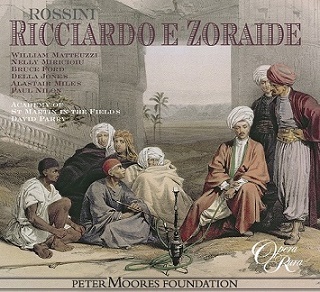(Above: The album cover)
William Charlton-Perkins writes a regular
feature for the media titled Classical Notes. This one is titled Rossini’s
Ricciardo e Zoraide.
A bravura aural feast - William Charlton-Perkins
Disclosure: Over the past several months, I have written this retrospective series as a tribute to the musical diaspora Opera Rara has created for generations of listeners. If the process has been one of self-indulgence, I hope it has been of interest to others too. The two divas who appear in this instalment occupy hallowed positions in the label’s discography. In gratitude to both ladies, I dedicate this column to the memory of a fellow devotee and much travelled friend, Michael McDulling. Michael’s passing 19 years ago evoked memories of him, making his way into the hearts of the Opera Rara family, not least those of its founders, Patrick Schmidt, and Don White. “This one’s for Michael, Stavros”.
Rossini’s celebrated
association with the Teatro San Carlo in Naples began with Elisabetta regina
d’Inghilterra in 1815 and ended with Zelmira in 1822 – a span of
only seven years, that nonetheless is counted among the most glorious in 19th
Century operatic history.
Ricciardo e Zoraide (1818) falls squarely at the half-way point of that extraordinarily fecund period. It is flanked by its forerunners, Otello (1816), Armida (1817), Mosè in Egitto (1818); and by its equally illustrious successors, Ermione (1819), La donna del lago (1819) and Maometto II (1820). And ending, as indicated above, with Zelmira (which I wrote about in a previous edition of this retrospective series).
The fact that Rossini chose to spend these crucial years at the peak of his creativity in Naples might be attributed, in part, to his hedonistic nature, which responded head-on the city’s elegant society, its salubrious climate, fashionable promenades and spectacular views of Vesuvius - not to mention its lavish cuisine.
But what got him there in the first place were the incomparable resources the city’s royal opera house offered, which lured the ambitious and hugely-gifted young composer into taking up his residence with the Neapolitan royal theatres, at the behest of the establishment’s cunning impresario and director, Domenico Barbaia.
Aside from the San Carlo’s fabled roster of superstars – Spanish Prima Donna, Isabella Colbran, Italian coloratura mezzo Rosmonda Pisaroni, and that high-wire duo of tenors, Andrea Nozzari and Giovanni David – the theatre’s orchestra comprised of hand-picked virtuosi who, under the directorship of the first violinist, Giuseppe Festa, numbered about 80 players. Together with that of La Scala, it was the most prodigious orchestra in the Italian peninsula.
With this dazzling palette as his disposal, no wonder Rossini produced his legendary succession of ground-breaking opera series, each as audaciously creative in substance as the next. In this august company, Ricciardo e Zoraide commands a proud foothold. Francesco Berio’s libretto puts a heady spin on its scenario of love, jealousy and honour involving a Nubian tyrant, a lovelorn Paladin, an Asian princess, and a put-upon royal spouse.
And notwithstanding Richard Osborne’s witty assertion that Ricciardo e Zoraide’s story reads ‘like a Marlowe epic rewritten by the Marx brothers’ (Master Musicians Rossini, 1986), it is Rossini’s bold treatment of its dramatic archetypes, and his mercurial score, that sweep the listener along. Virtually from word go, the high-energy crescendo of its colourful Overture finds its mark, with its delicious clarinet tints, beckoning a dizzying succession of bejewelled arias, visceral cabalettas and rhythmically driven ensembles and choruses.
The haughty tones of the great Romanian soprano, Nelly Miricioiu (Zoraide) and the legendary Welsh mezzo Della Jones (as her rival, Zomira) will be familiar to Opera Rara stalwarts. As will the distinctive timbres of the clarion-voiced American tenor Bruce Ford (Agorante, King of Nubia), and his high-flying Italian counterpart, William Matteuzzi (Ricciardo). Fellow cast members Alistair Miles and Paul Nilon, too, add distinction to the project.
David Parry, at the helm of the Academy of St Martins in the Field, gives a vibrant account of this Rossini masterpiece, ever alive to its dramatic scope which combines a sometimes almost lurid sense of exotic colour with turbulent overtones. Opera Rara’s characteristically opulent presentation includes one Jeremy Commons’ scholarly essays, scrupulously illustrated with line-drawings of historical proponents of the opera.
Offering a short list for sampling poses something of challenge. Whatever you select, don’t skip Bruce Ford’s stupendously macho account of Agorante’s Act 1 Aria and Cabaletta, [CD 1 Tracks 3 & 4]; or the exquisite duet for Zoraide and Zomira [CD 1 Tracks 8 & 9]; or the great Quartet finale to Act 1 [CD2 Tracks 5 & 6]. Then there’s Ricciardo’s staggeringly taxing aria and cabaletta that brings the curtain down on Act 1 [CD 1, Tracks 15 & 16]; and Ricciardo and Zoraide’s glorious Act 2 duet [CD 2 Tracks 12 & 1]. And, finally, as Zoraide’s great aria leads into the Act two finale, one marvels at Mme Miricioiu in sumptuous form, leading the company to a triumphant close. [Cd 3, Tracks 7 – 11].
Thrilling, this Rossinian wonderworld, which Stendhal, in his Vie de Rossini, hailed as ‘impassioned and full of oriental grandeur.’
For more information, and to purchase Opera Rara releases, visit the label’s retail platform, https://opera-rara.com/shopcatalogue - - William Charlton-Perkins












